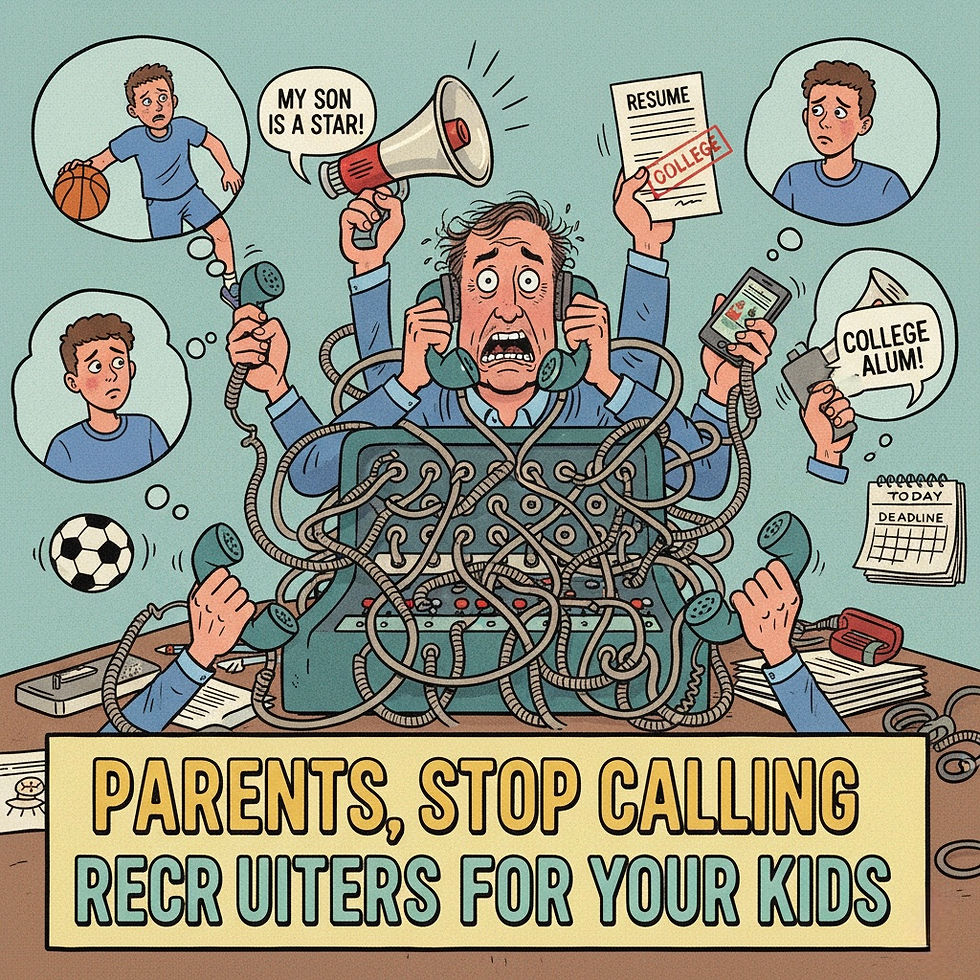Why Recruiters Don't Call Back (When Parents Intervene)
- Julia Levy
- Oct 28, 2025
- 3 min read

Let’s start with a true story.
A few years ago, a recruiter on my team received a voicemail from a parent. The message went something like this:
“Hi, my daughter met you at a career fair two weeks ago and applied for your internship program last week and hasn’t heard back. She’s perfect for the job. Can you please give her a call?”
The recruiter didn’t call the student. They came to me to vent.
And here’s the part most parents don’t realize: when you reach out to a recruiter on behalf of your child, you’re not helping. You’re hurting their chances.
I Get It, You Mean Well
If you’re a parent reading this, I know your heart’s in the right place. You’ve spent 20 years guiding, supporting, and advocating for your kid. Watching them struggle through silence or rejection in the internship search can feel unbearable.
But in the professional world, advocacy looks different. Once your student starts applying for internships, they’re stepping into a new identity: emerging professional.
And that means recruiters need to see them, not you.
When a parent calls or emails on behalf of a student, here’s what most recruiters think:
“Will this student be able to communicate on their own if we hire them?”
“Are they ready for the independence this role requires?”
“If they get stuck at work, will Mom or Dad call me again?”
It’s not judgment, it’s logistics. Employers need to know the student can navigate professional conversations solo.
The Hidden Cost of Overhelping
When you intervene, you might get an answer faster, but your student loses a learning moment. They miss the chance to:
Follow up professionally.
Handle silence and build resilience.
Learn how to advocate for themselves, which is a lifelong skill.
Those are the muscles they need to build now, when the stakes are low, so they’re ready for what comes later.
What You Can Do (That Actually Helps)
Coach, Don’t Call.Role-play how to send a professional follow-up email. Review a draft together, but let them hit send.
Normalize Rejection.Remind them everyone faces it and that it’s data, not a dead end. “What can we learn from this?” is a far better question than “Why didn’t they choose you?”
Share Connections, Then Step Back.Introduce your student to a contact if it’s relevant, but let them take it from there. It’s their conversation to manage.
Celebrate Effort, Not Outcome.Instead of focusing on offers, acknowledge progress: “I’m proud of how you followed up” or “That email was so professional.”
Trust the Process.Most recruiters truly want students to succeed. The ones who respond, interview, or give feedback are helping your child grow, even when the answer is “not this time.”
What Recruiters Wish Parents Knew
Recruiters notice students who take initiative, follow up professionally, and show ownership of their own process. Those qualities are more memorable than any GPA.
When parents step in, it can unintentionally signal that the student isn’t ready to take responsibility. But when parents stay in a coach’s role offering guidance, encouragement, and boundaries, it shows in the student’s confidence.
Your child doesn’t need a publicist. They need a partner.
So, Parents, Here’s the Real Win
Your goal isn’t to land them the job. It’s to teach them how to land any job. That’s what lasting success looks like.
Because the next recruiter they meet? They’ll handle that conversation solo and they’ll crush it, thanks to you knowing when to step back.
Reflection Questions:
Where could you shift from doing to guiding in your student’s career journey?
How can you help your student practice professional independence before they’re in the workforce?
Want to help your student navigate the internship search with confidence without overstepping?
Julia Levy’s From Hi to Hired is your inside guide to how hiring really works. It teaches students (and parents) how to approach the process strategically, build professional confidence, and stand out for the right reasons.
Find free tools and resources at hi2hired.com.




Comments